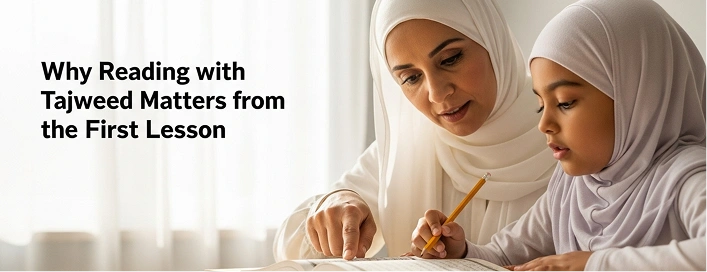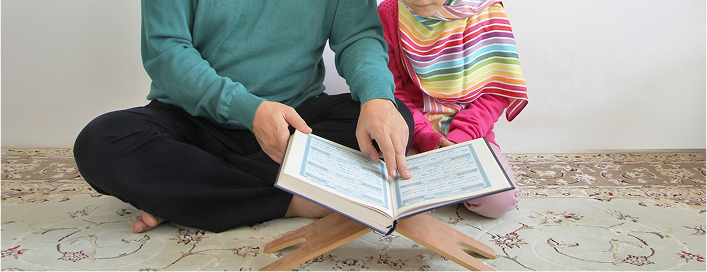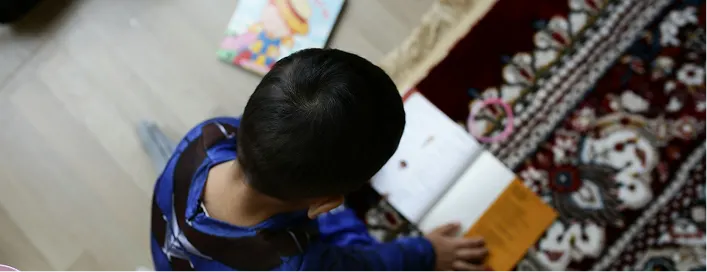Why Reading with Tajweed Matters from the First Lesson
The Importance of Tajweed in Quran Reading for Beginners
When you first start reading the Quran, it’s tempting to say:
“I’ll learn the rules later—right now I just want to read.”
But the Importance of Tajweed begins from day one. Tajweed isn’t just about sounding beautiful
it’s about preserving meaning, avoiding mistakes, and building confidence in your recitation.
From the very first session of the Foundations Course at Quran From Home, Tajweed shapes how learners
especially beginners in the UK—connect with the words of Allah.
What Is Tajweed and Why It Matters:
Tajweed comes from the Arabic root jawwada, meaning “to make better.”
In Quran recitation, it refers to pronouncing every letter correctly, giving each sound its rights, and applying
the rules of elongation, pauses, and emphasis.
It’s not an “extra layer” of advanced rules. It is the foundation of accurate Quran reading.
Think of it like road signs: you could drive without them, but mistakes and accidents would come quickly.
Tajweed makes Quran recitation flow as it was revealed—clear, precise, and spiritually uplifting.
💡 At Quran From Home, Tajweed is introduced step by step so learners never feel overwhelmed, no matter their age or background.
The Linguistic Science Behind Importance of Tajweed:
Arabic is a language where small shifts in pronunciation completely change meaning.
- Example: قلب (heart) vs. كلب (dog) – the difference is only one letter, but Tajweed ensures you never confuse them.
- Phonetics research confirms that subtle changes in articulation points (makharij al-huruf) alter both clarity and understanding.
Tajweed, therefore, is not just tradition—it’s linguistic science applied to the Quran.
Tajweed as a Science of Preservation:
For over 1,400 years, Tajweed has preserved the oral transmission of the Quran.
Without it, regional accents or casual speech could distort the message.
- With Tajweed: the Quran sounds the same in Cairo, London, or Jakarta.
- Without Tajweed: meanings risk being altered, and unity in recitation would weaken.
That’s why Tajweed is considered part of safeguarding the Quran, fulfilling Allah’s promise:
“Indeed, We have sent down the Reminder, and indeed, We will guard it.”
Common Misconceptions About Tajweed:
“Tajweed is only for advanced students”
- Fact: Beginners benefit most by starting early. Fixing errors later is much harder than learning right from the start.
“I can read without Tajweed and it’s fine”
- Even small slips can alter meanings. Tajweed protects the message, not just the sound.
“Tajweed is too hard for beginners”
- Rules are simple when broken down. Children, adults, and non-Arabic speakers in the UK often master basics within months.
With Tajweed vs Without Tajweed: A Clear Comparison:
| Aspect | With Tajweed | Without Tajweed |
| Pronunciation | Correct, precise letters | Confused letters (ط vs ت, ض vs د) |
| Meaning | Preserved fully | Risk of distortion |
| Confidence | Students recite aloud without hesitation | Hesitation and self-doubt |
| Spiritual Impact | Recitation feels connected and uplifting | Recitation feels mechanical |
| Learning Curve | Habits formed correctly from the start | Bad habits are hard to unlearn later |
How Tajweed Differs from Regular Arabic Pronunciation:
Everyday Arabic speech does not require the same precision as Quranic recitation. For example:
- Elongations (Madd): Daily Arabic often shortens sounds, but Tajweed requires exact timing.
- Nasal sounds (Ghunnah): Absent in casual speech but vital in Tajweed.
- Sakt (brief pause): Used only in Quran recitation to preserve meaning.
This shows why Tajweed is a unique system of precision built specifically for the Quran.
Neurological Impact of Tajweed Learning:
Studies in language acquisition reveal that rhythmic recitation activates memory centers in the brain.
That’s why children often memorize Quran faster than they memorize prose.
For beginners:
- Rhythm (tune + elongations) helps recall.
- Correct articulation stimulates both language and memory processing areas.
- Tajweed becomes a built-in aid for both understanding and memorization.
Research on Early Tajweed Learning in Non-Arabic Speakers:
A study among non-Arabic speaking learners showed:
- 80% of students who began with Tajweed achieved accurate recitation within 6 months.
- Students who delayed Tajweed took twice as long to correct mistakes.
For UK learners, this proves that starting Tajweed in the Foundations Course isn’t optional—it’s the fastest and most reliable path.
Key Benefits of Learning Tajweed Early:
- Accurate Pronunciation – Avoids confusion between similar letters.
- Preserving Meaning – Ensures the Quran’s message stays pure.
- Confidence in Recitation – Students read aloud without fear.
- Clear & Beautiful Style – Tajweed adds clarity and rhythm.
- No Bad Habits – Prevents mistakes that are difficult to unlearn later.
Practical Steps to Start Learning Tajweed from the Beginning:
Many UK students ask: “How can I actually start with Tajweed without feeling overloaded?”
Here’s the roadmap:
- Focus on One Rule at a Time – Apply one rule before moving to the next.
- Practice with a Qualified Teacher – Apps can’t replace real-time correction.
- Use Audio Recordings of Expert Reciters – Daily listening trains your ear.
- Apply in Short Surahs – Begin with Al-Fatiha and short Surahs.
- Track Progress & Get Feedback – Reviews keep motivation strong.
💡 Quran From Home teachers provide personal Tajweed roadmaps to guide every student week by week.
Spiritual Benefits of Tajweed:
Beyond clarity and accuracy, Tajweed deepens spiritual connection:
- Students feel khushū‘ (humility) as words resonate correctly.
- The beauty of recitation inspires hearts and families.
- Tajweed transforms Quran reading into an act of worship, not just study.
Quick Q&A on Tajweed:
Q: Can I skip Tajweed now and return later?
- You can, but you’ll spend double the effort fixing mistakes.
Q: Is Tajweed necessary for non-Arabic speakers?
- Yes—especially for them. Tajweed ensures accurate recitation even without full vocabulary knowledge.
Q: How long does it take to master basics?
- With consistent effort, 3–6 months is enough—faster with 1-to-1 support.
Q: Can kids learn Tajweed easily?
- Children absorb Tajweed naturally when taught step by step.
Q: Is Tajweed mandatory in Islam?
- Scholars agree that proper pronunciation is obligatory to preserve meaning, even if full mastery takes time.
How Tajweed Transforms the Foundations Course:

The Foundations Course isn’t just about Arabic letters. With Tajweed from day one:
- Students recite, not just read.
- Meaning and pronunciation stay intact.
- Confidence grows quickly.
- Recitation becomes spiritual, not mechanical.
This holistic approach is what makes Quran From Home unique for UK learners—accuracy and connection go hand in hand.
Final Thoughts: Tajweed Is the Key to Quranic Excellence
Skipping Tajweed is like learning music without rhythm—it never feels right. Whether you are a child, adult, or new Muslim in the UK, Tajweed is your path to accurate recitation, spiritual connection, and lifelong confidence.
Learn Tajweed with Expert Teachers at Quran From Home:
- Certified Azhar teachers.
- Flexible 1-to-1 online classes.
- Two free trial lessons included.
👉 Start your Tajweed journey today with Quran From Home.
📩 Contact us on WhatsApp to start today




